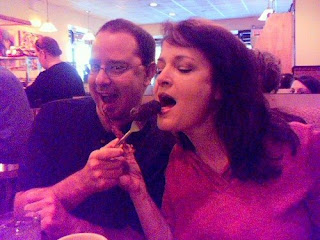Copy Edits
Edited to remove embarrassing lay/lie mistake. I said I wasn't perfect.
A very large envelope landed on my doorstep today, courtesy of the man in brown. Yes, my friends, copy edits have arrived.
This is the first time I've seen my manuscript since revisions. It's gone through some changes since then. Now it has a title page, a copyright page, acknowledgments, a bio and all the bonus material I wrote a few months ago. In short, it's looking more and more like a real book.
I'm new enough to all this to find the process interesting. Instead of groaning over the fact I have to juggle copy edits and a marathon sprint toward my deadline for book two, I'm actually excited.
I am one of those dorks who actually enjoys editing. In a former life, I was the bitch with the red pen who made freelance writers curse under their breath. But having been on both sides of that desk now, I understand how crucial a good copy edit can be.
Am I perfect? Heck no. I missed a lot of stupid typos and comma faults. Editing yourself is extremely difficult, but I made it as clean as I could before I submitted it to agents. And that's why the copy edits on my desk are not nearly as scary as they could have been.
Which leads me to some advice for all you aspiring writers: Learn how to edit your work. Don't look at me like that. How can you expect an agent or editor to want to buy your work if it's riddled with typos and murky sentence structure?
Take a class at the local community college. Buy a book on self-editing. Read Strunk and White. But don't fool yourself. Grammar and punctuation are two of your most important tools as a writer. Ignore them at your own peril.
A very large envelope landed on my doorstep today, courtesy of the man in brown. Yes, my friends, copy edits have arrived.
This is the first time I've seen my manuscript since revisions. It's gone through some changes since then. Now it has a title page, a copyright page, acknowledgments, a bio and all the bonus material I wrote a few months ago. In short, it's looking more and more like a real book.
I'm new enough to all this to find the process interesting. Instead of groaning over the fact I have to juggle copy edits and a marathon sprint toward my deadline for book two, I'm actually excited.
I am one of those dorks who actually enjoys editing. In a former life, I was the bitch with the red pen who made freelance writers curse under their breath. But having been on both sides of that desk now, I understand how crucial a good copy edit can be.
Am I perfect? Heck no. I missed a lot of stupid typos and comma faults. Editing yourself is extremely difficult, but I made it as clean as I could before I submitted it to agents. And that's why the copy edits on my desk are not nearly as scary as they could have been.
Which leads me to some advice for all you aspiring writers: Learn how to edit your work. Don't look at me like that. How can you expect an agent or editor to want to buy your work if it's riddled with typos and murky sentence structure?
Take a class at the local community college. Buy a book on self-editing. Read Strunk and White. But don't fool yourself. Grammar and punctuation are two of your most important tools as a writer. Ignore them at your own peril.


Comments